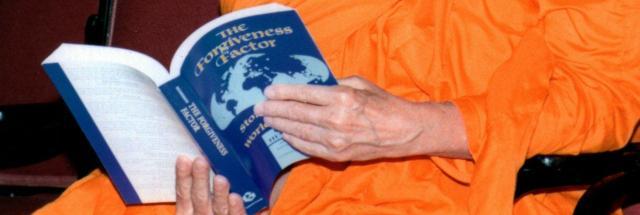KBOO 1 October 1987
The Pope’s visit to the United States was watched with particular feeling by a black American publisher, Joseph Green, from Baltimore.
He was reminded of the time as a teenager when he met the present Pope’s predecessor, Paul VI, at the Vatican as a representative of the travelling musical group ‘Up With People’.
Joseph had worked hard in the plane to Rome learning a few Italian sentences. He also thought he should translate his name into Italian.
‘What’s your name,’ asked the Pope, when the time came for the audience.
‘Giuseppe Verdi,’ the young black replied.
The Pope burst out laughing.
‘I looked over at the Vatican guard,’ remembers Joseph. ‘He wasn’t laughing.’
In his faltering Italian he said to His Holiness. ‘Speaking for thousands of young people all over the world I want to say that our generation is committed to remaking the world and the proposition that all people are brothers and sisters.’
‘Benissimo,’ responded the Pope.
‘I will never forget the look in his eyes, says Joseph. ‘I prayed for the present Pope and his mission. It underlines again for me the importance of prayer and of listening to God and of the application of faith to daily life. We need to live our lives beyond the things that are superficial and live in the hearts of men and women.’
Joseph told me the story last week in Virginia and also about his newspaper in Baltimore, ‘The Black Church.’. He had worked for a time after his stint with ‘Up With People’ as a reporter for ‘The Washington Post’ but had left it in concern about the image he was being used to project, the kind of stories he was called on to write.
Now through ‘The Black Church’, ‘a family upbeat paper,’ he was able to contribute to real community building. Forty thousand copies went out each month to 550 churches in Baltimore, to schools, hospitals, businesses. One month he had done a special issue profiling the Jewish community, another month the Asian population. ‘It makes for a better situation in the community,’ he says. People support him in his efforts to bring the community together. I fact, one cable company had asked him to take over a whole channel, not because he had money or TV experience but because, as the company said to him, ‘We prefer to deal with you.’
‘It is a result,’ he says, ‘of what I learned twenty years ago with Moral Re-Armament.’
Earlier this summer he met for four days in Colorado with some 500 young and not so young people who worked then or have worked since with ‘Up With People’ which grew out of Moral Re-Armament’s work with young people in the United States.
Some had not seen each other since the first years with ‘Up With People’, some had in the meantime experienced pain, rejection and failure. ‘Yet, somehow,’ as Joseph wrote in an editorial in ‘The Black Church’, ‘they managed to hold on to their ideals and their belief that ‘people’ were the most important things that God created, that life was meant to be meaningful and that enriching the lives of others was more noble than enriching one’s own life.
‘They believed that life, in part, was a mission and that each person, no matter their station, had a contribution to make towards the common good. They believed that good would win out over evil and that joy in the world would engulf and eliminate pain.’
They had held on to those beliefs, Joseph wrote, and for the most part had not become embittered or cynical or prejudiced. And at the end of the time together they had, as Joseph did to the Pope, pledged to one another that they would continue to live in such a fashion as to make things better in the world and to spread joy, love, peace and human understanding.’

